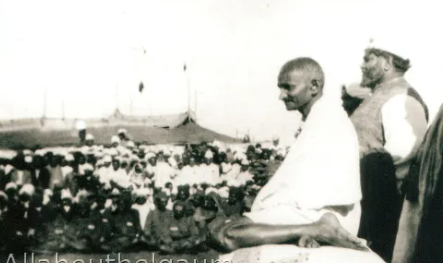Centenary of the 1924 Belgaum Congress Session: Gandhi’s Vision for Non-Violence, Swaraj, and Unity (GS Paper 1, History)

Context
- The Congress is celebrating the centenary of Mahatma Gandhi's historic leadership of the Belgaum (formerly Belgaum) Congress session, held in 1924.
- A two-day event will be conducted in Belagavi, Karnataka, on December 26-27 to commemorate the occasion.
- This event includes an extended session of the Congress Working Committee (CWC) and a rally to honor Gandhi’s lasting influence on the Indian freedom struggle.
Context of the 1924 Belgaum Session
- Mahatma Gandhi presided over the Belgaum Congress session in 1924, a crucial moment in India’s struggle for independence.
- Gandhi had just been released from prison after serving two years of a six-year sentence for his role in the Non-Cooperation Movement.
- His imprisonment had been the result of his outspoken criticism of British rule through his articles in Young India.
- Following his release in February 1924, Gandhi was deeply concerned with the lack of unity between Hindus and Muslims and the growing factionalism within the Indian National Congress.
- These issues prompted him to take significant steps to strengthen the movement.
- Gandhi, troubled by these divisions, embarked on a 21-day fast in September 1924, urging for unity and reconciliation within the country.
- His efforts laid the foundation for the historic Belgaum session.
Key Figures at the 1924 Congress Session
- Several key leaders attended the 1924 session, including Jawaharlal Nehru, Sardar Vallabhbhai Patel, Sarojini Naidu, and prominent figures from the Khilafat Movement such as Muhammad Ali Jauhar and Shaukat Ali.
- These leaders, alongside Gandhi, set the tone for India’s future path toward independence and unity.
The Significance of Gandhi's Leadership in the 1924 Session
- Gandhi’s leadership at the 1924 session marked the only time he served as Congress president.
- His address at the session emphasized several core themes that shaped his vision for India’s independence, including the principles of non-violence, social unity, and self-rule (swaraj).
- Gandhi’s thoughts during this session significantly influenced the course of the freedom struggle.
Non-Violence and the Non-Cooperation Movement
- In his address, Gandhi discussed the Non-Cooperation Movement, which had been called off in 1922 following the Chauri Chaura incident.
- Despite its termination, Gandhi emphasized the movement's successes, particularly in diminishing the prestige of British institutions through boycotts and protests.
- He reaffirmed his belief that non-violence, rooted in goodwill, would be a more powerful and sustainable path to India's freedom than revolutionary violence.
Unity Among Hindus and Muslims
- Another pivotal aspect of Gandhi’s address was his call for Hindu-Muslim unity.
- He stressed that true self-rule could only be achieved if both communities worked together for the common cause of independence.
- Gandhi also made a strong case for the removal of untouchability, equating it with the struggle for swaraj.
- He argued that Hindus could not truly claim swaraj until they liberated and uplifted the oppressed and marginalized sections of society.
Swaraj and Social Reforms
- Gandhi outlined several reforms that he believed would help India achieve swaraj.
- He suggested moving India’s final court of appeals from London to Delhi, and he advocated for Hindustani to be adopted as the official language in provincial courts and governments.
- Gandhi also called for a stronger emphasis on self-reliance, particularly through the use of khadi (handwoven cloth), symbolizing India’s economic independence.
Embracing Khadi and Self-Reliance
- Gandhi’s promotion of khadi during the 1924 session was a significant move toward self-sufficiency.
- He encouraged the masses to spin and weave their own cloth, promoting the idea that true independence would only come when people became economically self-reliant.
- This message resonated deeply with the public, fostering a sense of collective empowerment.
Lasting Impact of the 1924 Session on the Freedom Struggle
- The Belgaum session of 1924 had a lasting impact on India’s freedom movement, particularly in rural areas.
- Historians suggest that the session helped promote peasant consciousness and increased participation from rural communities in the nationalist struggle.
- Gandhi’s emphasis on khadi and self-reliance further strengthened the village economy, particularly in Karnataka and other parts of India.
- By aligning the freedom movement with social reform and unity across religious divides, the 1924 session laid the foundation for a more inclusive and widespread push for Indian independence.
Conclusion
- The centenary of the 1924 Belgaum Congress session serves as a reminder of Gandhi's vision for India—a vision based on non-violence, unity, social reform, and self-reliance.
- As the Congress gathers once again in Belagavi, it reflects on the powerful ideas that Gandhi presented a hundred years ago, ideas that continue to guide India's democratic journey today.


